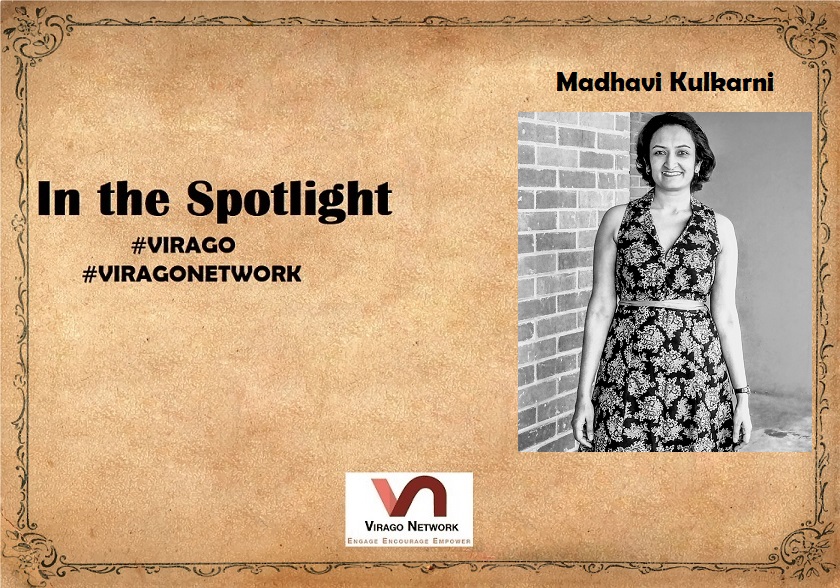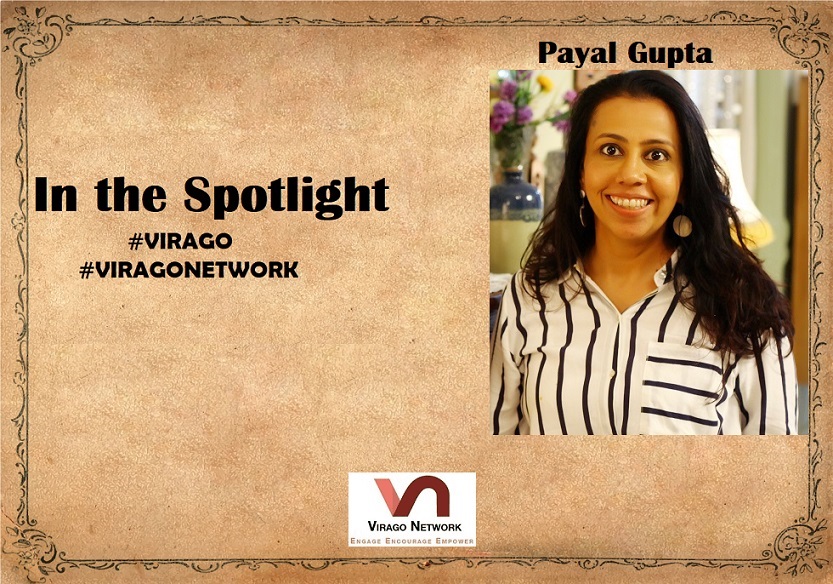
Madhavi Kulkarni – Diversity and Equity Professional
Meet Madhavi Kulkarni – Diversity and Equity Professional
Highlights about Madhavi:
- Diversity and Equity professional, SUM collaborative
- HR Coordinator at Foodshare Toronto
- Youth Mentor with YES (Youth Employment Services)

VN: Please tell us about your profession?
I am a Diversity and Equity professional working towards improving organizational practices and introducing equity into daily work life. I am part of an amazing collaborative called the SUM collaborative, which consists of women across the world from various fields, who are working towards improving inclusion, belonging and equity across their specific fields. You can read more about them here:
https://www.womensworkinstitute.com/the-collaborative
Presently, I am working as the HR Coordinator at Foodshare Toronto, a non-profit
organization that works with communities and schools across Toronto to deliver healthy food and food education, while striving towards Food Justice. We believe every single person deserves access to affordable high-quality fresh food. As part of this role, I handle end-to-end HR needs and requirements for people with varied employment styles, while uplifting existing processes to improve employee equity and experience. This is seen as an opportunity to tackle systemic barriers facing people across all ethnicities, as well as working towards equity in our employee life cycle by targeting and reducing bias, celebrating differences and opening dialogue on sensitive topics that impact a lot of people.
I am also a Youth Mentor with YES (Youth Employment Services), where I work with youth with underprivileged background and provide support and guidance on career mapping, how to prepare for interviews and nail them, how to identify which field to work in, and
how to work towards improving skills constantly, that will allow them to apply for higher positions.
VN: What’s the #1 attribute that helped you get where you are in your career?
It was a belief that I am capable of doing anything I want to. This has made me learn a lot: from everyone around me, about every possible field and how that knowledge can be used to improve an organization.
VN: What were or are the biggest challenges you faced going back into the workplace after children?
I have a beautiful daughter, and I took a conscious decision to stay at home until she grew big enough. I never use the word “Restart”, but the word “Resume” to describe my journey back to being a working woman. The biggest challenge I faced was convincing hiring managers and recruiters that I have not lost any of my skills during my break. People never lose skills. In fact, it has been proven that becoming a parent gives people skills that they would not learn easily at corporate settings – ideating without boundaries, mediation, patience, preparation, empathy, counselling, negotiations etc.
VN: How do you manage your family life while pursuing your career?
I ensure work stays at work, and the minute I enter my home, my time is entirely my family’s. I have a lot of support from my spouse, and this is THE most important factor that assists parents in getting back into the workforce. I also discuss challenges I may be facing with my spouse, parents and in-laws, to get an outside opinion or suggestion, that usually helps me see varied viewpoints and helps with my decision making.
VN: What accomplishments are you most proud of?
Quite a few actually! One was when a woman sales agent in her 40s told me that since she has seen me work hard and actually lead a team, she too feels she should grow upwards in her job. She then worked towards her goal, and is presently leading a team of sales agents, and is on the fast-track to an assistant manager post. Another is when I shifted countries, had to give up a stable career and had to start a few steps backwards, without letting go of my goals and dreams. Lastly, it is every single time when my daughter tells me she wants to grow up and work, like me. That is the biggest lesson I can give her – that she should become independent, be able to live a financially secure life, and is capable of doing anything she wants to in her life!
VN: What has been the greatest challenge(s) in your career and how did you overcome it (them)?
My biggest challenge has always been with getting people to take me seriously, and acknowledge my ethics & skills. I have been made fun of, for standing by my ethics. I have been berated for not having skills equal to a male colleague. I have been ridiculed (really!) for having a child and daring to resume my career while she is still young. I handled all this with conviction and a belief in myself – Ethics are non-negotiable (I would not want to ever work for a person or company that asks me to compromise on my ethics). Skills- I can learn what I don’t know, and I can prove my skills through the work I do. Having a child and resuming work – It is really no one’s business as to if and when I should work.
VN: When faced with adversity, what pushes you to keep moving forward?
It is the saying – Tough times never last, tough people do. Also, a very important lesson from my parents – Learn when things go wrong, and make sure you don’t repeat the same mistake. There is no better time to learn.
VN: What are the challenges to female leadership?
I feel token representation is the biggest challenge that women face in leadership roles. They are brought on to show diversity but are measured differently compared to their male counterparts. These days, a lot of talk around equity and diversity is starting to impact such actions, but a lot still needs to be done. There is a widely-held consensus – Women need to learn more, prove themselves more, keep innovating themselves, “pretend” to be non/less emotional…. Thankfully, a new breed of colleagues are present who do not expect this from any woman. She should just be herself and give her best, just like male employees. She should be treated equally, tested equally, and rated equally – and the onus of this lies on supervisors and organizations.
VN: What are some strategies that can help women achieve a more prominent role in their organizations?
Organizations need to look at this as an overall issue – Women across all levels should be encouraged to work, they should be treated on par with their male colleagues, they should be paid at the same rates (Equal pay is a right and a must!), they should be assessed against the same parameters as their male colleagues, they should be considered for the same opportunities that their colleagues are considered for, they should be mentored equally (actually more!), they should be recommended for higher positions as much as possible – These are just some of the actions an organization can take to help women achieve prominent roles. Women need to have some awesome mentors – networking, connecting on LinkedIn, identifying bosses or colleagues who act as great sounding boards – these are just some actions that women can take.
Finally, it is just a belief in themselves, that they are capable of doing anything they dream of doing, and that they have the courage and capacity to do so – This is the biggest motivator of them all!
VN: Have you encountered any gender-specific challenges or obstacles in your career?
Of course! I have been told I am too emotional (Just like a woman! Sigh!), too empathetic, too family-oriented (So were my male colleagues at that time!), too much of everything else!
VN: If you had the power to change one thing in the corporate world for working mothers, what would you change?
I would slightly amend the question to apply to all parents – not just women. I would ensure all working parents have childcare facilities at their workplaces, are allowed to work flexibly whenever they need and are never questioned about their choices! We live in an extremely connected world, allowing people to work from anywhere. This should be leveraged to the max to allow people to stop worrying about their kids and work, and work comfortably. Also, parents should not be penalized for putting their kids before work – if their kid is ill, they will not be able to give their best anyway! Allow them to spend time with family… they will come back refreshed and full of innovative ideas!
VN: What is your definition of success and/or your mantra?
I don’t have a mantra as such – I just believe that a woman has an inner power, a strength, that gives her so much courage to get through anything and everything in life. I gauge my success by my happiness, and the satisfaction I get in doing small things – both at work and in my personal life.
VN: Which Female Leader(s)/Entrepreneur inspire you the most and why?
There are so many amazing women across the world! Presently, I am super thrilled by Nirmala Sitharaman (Finance Minister, India).
During her previous tenure, she was the first woman Defence Minister of India. During her present tenure, she is the first woman Finance Minister of India, having presented her maiden Budget. Imagine the number of glass ceilings she must have shattered!!
VN: What are your thoughts on the glass ceiling? Does it still exist for women in the workplace? And if so, how can women professionals navigate that?
Yes. The glass ceiling does exist. Believe in yourself, have some great mentors, learn how to navigate tricky situations, constantly learn about every possible thing under the sun (tough, but we are quite smart!) and remember, to jump high, you always bend your knees first! Don’t think of giving in as something negative. It just gives you the drive to jump high in life!
VN: If you could go back to when you were just beginning your career, what advice would you give yourself?
It would be to take time, keep an open mind, learn about varied associated fields, identify how you and where you want to grow. Remember – It is ok to be wrong, it is ok to want to pivot to new fields, it is ok to stay where you are, it is ok to leave a valuable opportunity, it is ok to put family before work (a very common situation for women professionals), and finally – it is OK to put yourself first. If you are happy and satisfied, nothing else matters.

Payal Gupta- CEO of Chef Payal Gupta’s Foodstyling Company
Meet Payal Gupta – CEO @ Chef Payal Gupta’s Foodstyling Company & a TEDx speaker
Highlights about Payal: 
- CEO, Chef Payal Gupta’s Food Styling Company
- A TEDx Speaker
- Advisory Board Member, Virago Network
- Winner of Super Achiever award, by Femina & World Women Leadership Congress (Food Sector)
- Listed by Social samosa, as Social Media’s Superwomen
VN: Payal, Please tell us about your profession?
Payal: My name is Payal Gupta. I work as a chef and food stylist In India. I am also the founder of Chef Payal Gupta Food styling Company and www.chefpayalgupta.com is my company website. While being a chef is all about cooking delicious food, food styling is all about making food appear delicious(it need not be tasteful to consume at all). When styling food I work as a makeup artist for food cooking, tweaking, positioning and garnishing food till it is absolutely perfect and beautiful to be photographed by a photographer or videographer. Food is all about its taste, texture, and flavors. I make people experience all these dimensions with just their eyes with my images. Through these images, my core task is to aid FMCG and Non-FMCG companies sell an idea or product related to food. In my organization I juggle a few responsibilities currently:
- The major part of my role entails bringing in new ideas related to garnishing and plating of food for my clients
- I am also responsible for keeping myself updated on the latest trends in the food industry so that I can provide new food-related ideas to my clients constantly. We have a workshop in which we constantly work and experiment with new ideas.
- Alongside this, I also help my team in business generation constantly
- And finally, I am also working towards launching 2 of my start-ups one related to food and other related to garments
VN: What’s the #1 attribute that helped you get where you are in your career?
Payal: Perseverance
VN: How do you manage your family life while pursuing your career?
Payal:
- To balance my family life with my career I give myself a head start of 2-3 hours each day by getting up before anyone else in my family. This helps me to think peacefully and finish a few important work-related activities before my family gets up
- I discontinued using WhatsApp 3 years back which makes sure that I use my phone optimally and thus have time for my family
- I do yoga and meditation regularly which keeps me in the NOW so I am always present fully with my family when I spend time with them
VN: What accomplishments are you most proud of?
Payal: Though there are many accomplishments that I am proud of I would specifically like to mention 2 of them.
- In 2018 I was awarded amongst 150 women globally for my contribution to the food industry by Femina and World Women Leadership Congress. This award was held in Taj Lands End, Mumbai(the same place where I worked once as a trainee chef). Being felicitated in a place where I 1st started to train was an experience by itself. Nothing could be more gratifying.
- In March 2019 I gave a TEDx talk at NIT Silchar. My talk was about how ordinary things in life can combine together to give us an extraordinary career. During my talk, I spoke about how I changed my career from being a qualitative researcher to becoming a very successful food stylist in India. I also spoke about all the learnings and challenges I had in the process of becoming a food stylist that transformed not only my career but for me as an individual forever. My mother and husband had accompanied me for this talk. When I got off the stage post my talk, my husband ran and hugged me. The organizers were overjoyed and my mom was speechless. The thundering noise of the claps in the auditorium seemed to tell her that all her sacrifices while raising me was worth it. Post the talk my mother could not leave the auditorium for 1.5 hours as everyone wanted to click pictures with me. I could see how special she felt. These moments are priceless in life.
VN: What has been the greatest challenge(s) in your career and how did you overcome it (them)?
Payal: The 2 greatest challenges in my career were lack of funds during the initial period of my career post my divorce and the huge amount of rejection I faced while trying to market my food-styling craft.
To overcome my financial crisis I did a few things:-
- I took up multiple jobs. Most times this really was not easy as I would feel physically completely exhausted
- I rented a modest house at that time and curtailed all my expenses
- At times I even borrowed money from family and friends which I returned over a course of time but most importantly I kept myself in good spirits by praying constantly and believing in myself
To overcome rejections while marketing my food-styling career I took a few measures:-
- I experimented with food regularly at home to enhance my food-styling craft. This did 2 things for me-Firstly it kept my mind occupied and prevented me from any negative thinking and secondly, it kept me prepared for assignments in the future. What happened as a result of this practice was that when I was called over for assignments, I would do a spectacular job and make an impression
- I reached out to newer clients regularly in spite of being rejected and never stopped trying
VN: When faced with adversity, what pushes you to keep moving forward?
Payal: When faced with adversity I always ask myself what is my goal and is my upset bigger than the goal I wish to achieve. Each time this exercise pays off and I am able to pull myself out of adverse situations.
My goal in life is to provide amazing work opportunities and empowerment to women through my businesses. I believe that when women in a country are empowered the nation gets empowered and grows. So in front of a goal like that, no adverse situation is ever big enough.
VN: What are the challenges to female leadership?
Payal: The challenges of female leadership are varied for varied situations. Broadly let’s assume the following situations: –
- A woman works in the office with male Colleagues
For ages societies across the world have seen men and women in 2 broad roles. While men have been the bread earners in a family, women have been homemakers. It’s not a wonder then when we find males spearheading most organizations and finding it difficult to relate to a female boss in case a situation arises. The result of this is that women at work do not get treated as equal or be taken seriously at times. Firstly from childhood, both boys and girls must be raised in a genderless society. The schools and families of children should ingrain this in them. When this happens the basic root cause will get addressed and most men and women will understand and respect each other. Then leadership will be an outcome of skill and not gender. So women leader will surely then have fewer challenges then.
Also, there is another challenge which is purely social. It’s about social etiquette in workplaces. Since again men have not been trained properly in this aspect they think it’s mainly to harass a woman, comment on her or rub her in the wrong way at work. This tends to disturb a woman in the workplace and interferes with her leadership role. For a leader to work it’s important for her to feel safe and calm in the workplace. The only way out then is to form a panel at work which takes care of the woman workforce and interacts with them from time to time to ensure their safety and mental peace.
- A woman who runs her own business
As compared to a woman working in the office a woman who runs her own business gets to choose her team so that’s definitely an advantage for her. Here again, the challenges are the same as above except that since she pretty much chooses her staff she herself can hire more polished male members who understand gender equality and respect women.
VN: Payal, what are your thoughts on the glass ceiling? Does it still exist for women in the workplace? And if so, how can women professionals navigate that?
Payal:
VN: What are some strategies that can help women achieve a more prominent role in their organizations?
Payal: To ensure that women hold a prominent role in their organization the following steps can be undertaken:
- Attention and resources should be focused on recruiting, retaining and developing women leaders in every organization
- Onsite childcare, maternity benefits, women’s networking groups, mentoring and development are important to women so these facilities should be provided by organizations to ensure that women work with a free spirit. With the constant pressure of multitasking, parenting and work-life balance women tend to lose themselves. We first need them to connect with their own self and rediscover the joy in life itself by reducing their work pressure and providing her with a support system. Once this is achieved then they will surely go places and take up prominent roles in the organization.
- Organizations should give thoughtful attention to creating a gender-neutral environment in the workplace. To do that, they must first truly understand what women in the organization want and need from their employers. So, for example, some want the option of flexible work arrangement while others may want job sharing. For some, it might even be of great importance to have employee resources groups and mentors in their place of work.
- Some of the best organizations have women’s task force groups that they can ask to better understand what women need and value most. If women aren’t staying at the organization, it’s important to know why and what can change to better enable them to stay for the long-term.
Once this has been determined, the next step is to implement these programs, policies, and practices and to measure them for effectiveness.
VN: Have you encountered any gender-specific challenges or obstacles in your career?
Payal: Yes, I too do encounter gender-specific challenges in my career. At times most men in my field of work go out and drink/smoke with fellow men and women to forge a bond with them and get work. I abstain from drinking or smoking totally by choice so getting work via that medium does not exist for me. Having mentioned this I also believe that its own skill sets that take an individual ahead in life and these obstacles are only temporary.
VN: If you had the power to change one thing in the corporate world for working mothers, what would you change?
Payal: If I had the power to change one thing in the corporate world for working mothers I would change the working hours for them and make working more flexible in nature for working mothers. Most young mothers today have nuclear families and thus have no parents to take care of their kids. The result of this is that once these women go to the office their kids are in a creche. These creche raised kids are not able to imbibe family values or form the bond with their parents which every child should in the growing up years. Now in case, a woman is allowed to work 6 hours from office during the non-peak time and rest 3-4 hours from home without compromising on her salary or effort-This change would be great. This move would ensure that she is able to work, take care of herself and her kids too. This move might not do away with putting the child in creche completely but it will reduce the number of hours a kid stays in a creche(daycare). In the end, this effort will make sure that the children who will be taking our country forward tomorrow have a better foundation for life.
VN: What is your definition of success and/or your mantra?
Payal: For me, success is all about being able to give 100% to everything that we do in life and live in the NOW. It’s about loving who you are and being in complete acceptance of who we are not.
VN: Which Female Leader(s)/Entrepreneur inspire you the most and why?
Payal: For me, my mother inspires me most. She is a leader in the truest sense. For me, a leader is a torchbearer and one who takes responsibilities. My mother taught us great values in life and always guided us. My discipline and perseverance is a gift from her. She taught me to dream and to fly without wings.
My mother has been a homemaker all her life. The courage she exhibited in raising and educating me and my siblings when my father got bedridden and could not work all his life always inspires me. She is educated modestly and never went to work but still managed to give me and siblings a spectacular life.
VN: What are your thoughts on the glass ceiling? Does it still exist for women in the workplace? And if so, how can women professionals navigate that?
Payal: I can talk about my field and say that there is no glass ceiling for my food styling field because maybe women and cooking go hand in hand. However when it comes to women directors or Cinematographers from our industry I have seen an unsaid glass ceiling exist for them (people still think handling camera is a man’s job, directing a film is a man’s job). Glass ceilings exist because of a few reasons:-
- Society thinks that a particular role is more suited for men versus women. Having a man head that role will bring in more value than a woman heading it. For example in the films and entertainment industry men are paid more than women. Men are perceived as heroic so if the lead protagonist is a male then a given film makes more money. Most people still love watching Superman and Batman rescuing Damsel in distress. If however, the lead is a woman the film makes lesser money reason being most men would abstain from watching the film thinking that the film is women-centric and boring.
- Some roles like technical ones where women themselves feel that men are better so no wonder that their growth there is stunted and there seems to be a glass ceiling there
- At times some challenging roles in superior positions are not given to women if they have kids thinking it might not be manageable by them. At such points, a lesser deserving male is handed the role. No one thinks that the right way to tackle this is to provide support to the woman to take that role up by giving her childcare support at work.
- Women are driven by fear at times so sometimes they do not themselves speak up when they are being discriminated against
- Most married women tend to leave work early as compared to men due to their family responsibility so when considering a promotion most often males are given more weight so it appears that there is a glass ceiling for them. To change this we must address this at the family level by making men participate in housework as much as a woman.
VN: If you could go back to when you were just beginning your career, what advice would you give yourself?
Payal:
- Firstly I would advise myself to be more organized about my work and document all my learnings about work. This would ensure that my valuable learnings remained with me forever and could be passed on to the next generation
- Secondly, I would advise myself to be wiser monetarily
- Thirdly I would ask myself to be in the moment and not wander away in the past or future to be a more effective professional

Oprah Winfrey: Self- made billionaire who created history by turning her life from the Rags-to-Riches
Oprah Winfrey: Self- made billionaire who created history by turning her life from the Rags-to-Riches
-By Mani Mukhija

With every experience, you alone are painting your own canvas, thought by thought, choice by choice. ~Oprah Winfrey
“Surround yourself only with people who are going to take you higher.” ~ Oprah Winfrey
Winfrey a “modern successful woman of the times” needs no introduction. Oprah Winfrey is one of the most recognized and well-respected women in the world today. Life has not always been easy for the self-made billionaire. Oprah, an actress, television host, philanthropist, producer and an entrepreneur, who is today worth $2.7 billion as a famous US talk show host and a media proprietor, was born to a poor single mother in Mississippi.
She was a victim of sexual abuse by friends of her mother, Vernita. After some time of bad influence and behavior, she later went on to live with her father in Nashville, Tennessee. Vernon made his daughter’s education a priority, and she became an honors student. Oprah earned a full scholarship and majored in Communications from Tennessee State University. This was when her career in media started taking a shape.
In the year 1976, she then moved to Baltimore, Maryland and hosted a television chat show named as “People are talking” and this show ran successfully for eight years. This led her to get recruited in the Chicago TV station in order to host her own morning show and she took her show from last place to the first place. Within months she turned that show into the top-rated talk show in Chicago. The show was soon renamed The Oprah Winfrey Show and syndicated nationally, turning Oprah into a millionaire.
Oprah Winfrey became so exceptionally famous not just because of hosting her globally renowned talk show or by being an amazing actress. She could do it because of her determination and resilience. She exhibited to the world her core traits of being a resilient, courageous, compassionate, amorous, sensitive, and above all else, a human being just like the rest of us. She is an exemplary woman who teaches us to just be ourselves.
Self-esteem comes from being able to define the world in your own terms and refusing to abide by the judgments of others. ~ Oprah Winfrey

